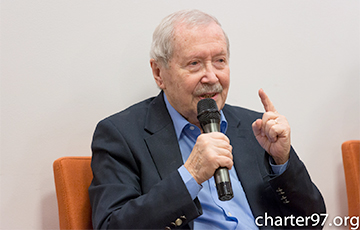Former Polish Defence Minister: Belarusian Army Is Very Neglected
18- 4.03.2024, 23:19
- 11,594

PHOTO: CHARTER97.ORG
What reforms do our troops need to join NATO?
The presentation of the book "Belarus in NATO" took place in Warsaw's "East European House" (Dom Wschodni).
The discussion was attended by the leader of the European Belarus civic campaign, ex-presidential candidate Andrei Sannikov, ex-minister of defence of Poland, former vice-president of the European Parliament Janusz Onyszkiewicz and the well-known Russian-American historian Yuri Felshtinsky. The moderator was Natallia Radzina, editor-in-chief of Charter97.org.
Former Polish Defence Minister Janusz Onyszkiewicz described the difficulties Poland faced when it decided to join the Alliance:
"When Poland joined NATO, the question immediately arose: what about our military hardware. It should be understood that the hardware we used was not worse than the Western ones. They were always afraid of us (of the Warsaw Pact countries - note).
It was also a time when Poland was not threatened by war. It was possible to take our time and change a lot of things. Therefore, the main problem, if we use modern language, was not in "hardware", but in "softwear", in switching to a new military thinking and strategic culture, a different way of military command, a greater decentralisation.
When I joined the Polish army, it looked like this: a certain officer comes in and reports to a superior one what he wants to do. The latter was to confirm. This means that the lower-ranking officers were completely deprived of the possibility to decide something, there was no field for individual action.
Another problem is the knowledge of English. Not the general staff, not the top military commanders, but the entire armed forces join NATO. Therefore, the knowledge of English is extremely important.
I will say that a huge problem for us, for those who were preparing to join NATO (and I was the Polish Minister of Defence at that time and was preparing our army for the membership in the Alliance), was to find officers who direct the planes supporting the infantry actions. They had to be in constant contact with the pilots, everything happened in a stressful situation, in constant noise. It took an extraordinary knowledge of English, because in such a situation it was very difficult to hear and make out anything. And it was quite difficult to find people who would pass such an exam.
When the big programme of English language training in the army started, we had a new problem - our officers were taught the wrong English. Who was teaching them? English teachers from schools who knew the language of Shakespeare, and what was needed was, I would put it this way, "solid front-line language".
I remember when we went to Ukraine with a group from NATO, the Ukrainians were supposed to show us a military unit. And they took a local teacher to translate. And she just couldn't do it. I had to do the translation myself, because I was better at it."
Janusz Onyszkiewicz assessed the current state of the Belarusian army:
"If we talk about the technical component, indeed, the Belarusian army looks very neglected. The number of hours flown by the pilots of the Belarusian army is 10 hours a year, while in NATO - 160. A pilot has to be in good shape all the time. This is just a gigantic difference.
If you look at the funds allocated for the Belarusian army, considering that everything is cheaper in Belarus, they are very small sums."











